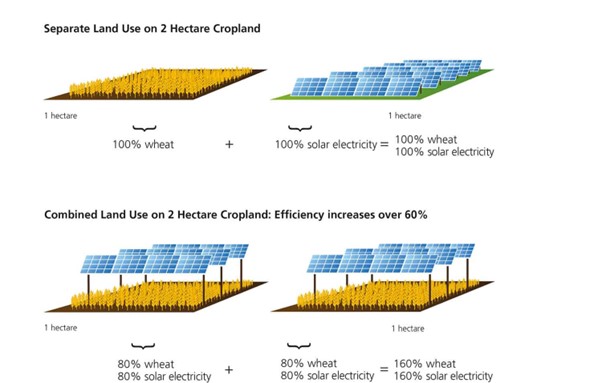Sun-Loving Succulents: How Solar Panels Benefit Plant Growth?
Every plant needs a sufficient amount of solar energy for normal growth and development. Some of them are saturated with it in just a few hours, but some cultures need a lot of radiation. The second category includes succulents. These are beautiful plants that have an original appearance and are often used for decorative purposes. They can be grown both indoors and outdoors.
However, in both cases, it is necessary to provide conditions for the entry of a large amount of sunlight. Sometimes it is difficult to do this due to the presence of tall plants in the yard and rooms with minimal lighting. In such situations, the best solution can be solar systems, which ensure the stable operation of lamps and other devices. In this article, we will tell you how to grow succulents with solar panels, and how they contribute to the growth and development of other plants.
What Kind of Lighting Is Needed for Growing Succulents?
The beautiful appearance puts the plants in demand among buyers who want to arrange a stylish landscape on their site or complement the beautiful interior of the room. However, it is necessary to remember the main requirement for their cultivation – the presence of sufficient lighting. If its quantity is insufficient, then plants may grow weak and dull, and some species may die altogether.
To prevent this from happening, you need to plant them only in open areas on the street and use additional lighting sources in the room. However, there is a significant drawback to this approach. In the case of using a large number of lamps and lights, electricity costs automatically increase. Solar plants, which are selected taking into account the required power and frequency of use, help to avoid them.
The necessary models are easy to find because they are offered by many “solar companies near me” in each region. Thanks to the installation of structures, you can provide optimal conditions for the growth and development of plants, as well as save on electricity bills. The following characteristics are important for succulents:
- Power level: These are the lumen-watt indicators of lighting devices. The higher they are, the better for plants.
- Brightness: In this case, the level is determined using lumens. For growing succulents, you need devices with indicators of about 400-800 lumens per 1 unit of area.
- Spectrum of radiation: For normal development, plants need lamps and lights with a full white spectrum.
When considering the use of solar systems for growing succulents and other plants, it is also worth mentioning alternative methods of their use. Panels can not only power lighting devices but also irrigation equipment. In this way, the owners get more benefits. The use of solar panels for watering plants and the provision of lamps with energy allows you to significantly reduce costs, as well as create a comfortable environment for full-fledged development.
How Does Growing Crops Under Solar Panels Happen?

Photovoltaic systems are multifunctional systems and can provide many advantages in agriculture. It is not only about the uninterrupted power supply of lighting devices but also about the protection of crops from excessive radiation. This new progressive direction was called “agrovoltaics”. Its essence is that the panel systems are placed over the crops that grow in the fields. Even a solar panel farm can be used for this purpose.
They are used by entrepreneurs and farmers who own large plots of land. The positive impact of such systems has already been proven by many scientists. In particular, one of these studies was conducted by employees of the universities of Maryland and Arizona. They organized a series of experiments in which they discovered the benefits of placing solar panels over plants.
In several of them, during testing, performance increased from 100% to 300%. These are impressive results that became the basis for opening a new field of application of solar panels and obtaining more benefits from their installation. This opportunity is now used by many agricultural enterprises, which increase productivity and save money at the same time due to integrated use.
However, this approach is effective for some types of cultures. These are plants that need only a small amount of solar energy. If they receive it more than necessary, degradation occurs and productivity indicators decrease. In this case, you can use another method of using solar power for growing plants. Installations cover them with their shadow, and the generated amount of electricity can be used for watering them.
In addition, agrovoltaics has several additional features. When growing plants in the shade created by solar panels, the need for water is reduced. The structures prevent excessive evaporation, so the crops do not need a large amount of moisture to restore the water balance. In addition, plants in the shade can release a certain amount of water in the form of dew. It settles on the solar panels and ensures a decrease in their temperature. Accordingly, the productivity factor of the panels increases significantly.
What Advantages Does Solar Power for Gardens Provide?
Solar systems are also extremely useful for the garden. Constructions in this case can be used in many different ways:
- Powering timers that ensure regular watering: These devices are used in small areas to maintain the required level of moisture.
- Outdoor solar lighting: Panels can be installed on lanterns in the garden. They accumulate electricity during the day and release it in the evening, providing lighting.
In addition, solar panels can power garden equipment for cultivating plants and soil. Thus, the designs provide many benefits and help save money.
Conclusions
Solar systems are a great solution for providing the necessary conditions for growing succulents and many other plants. They are even actively used to improve the technique of growing crops. The wide scope of use is due directly to the specifics of solar panels. They not only convert sunlight into electricity but can also create shading, which is important for the development of various crops.
